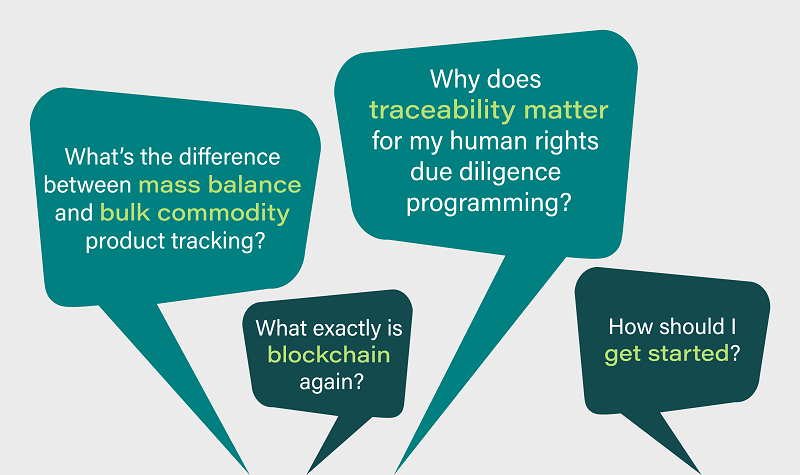
The traceability sector is growing fast, but how can it be harnessed to better inform labor rights due diligence efforts?
By Allison Arbib, Director of Applied Research, Verité
Nine billion dollars (1)–a conservative estimate on how much the supply chain traceability sector will be worth within 10 years, or even sooner. It’s a big business. And it’s growing fast because companies know that understanding where their products come from and being able to offer assurances to regulators and consumers is critical to being able to run profitable and resilient businesses.
Companies are familiar with the benefits of traceability to the bottom line – how it can reduce operational costs, improve quality and safety control, and reduce regulatory and reputational risks. Through the Supply Chain Tracing & Engagement Methodologies (STREAMS) project, Verité is examining how traceability can also be used to promote labor due diligence.
As we were designing the STREAMS project, we heard a lot of questions from companies, government officials and civil society with basic questions about traceability and also questions about how to relate due diligence efforts to the increasing push for traceability.
What’s the difference between mass balance and bulk commodity product tracking? And why does it matter in terms of my human rights due diligence programming?
What exactly is blockchain again?
I need more insight into my supply chains before I would even consider tracking individual products. How should I get started?
I’ve already been collecting a lot of supply chain information. Should I try to verify or check it? What do I do with it? Should it just live in spreadsheets forever?
The Supply Chain Traceability Matrix
Verité has launched the STREAMS Supply Chain Traceability Matrix website to help supply chain stakeholders answer these questions and demystify some of the complexities related to traceability and its relationship to due diligence.
The Supply Chain Traceability Matrix offers resources and information on
- Traceability as a system rather than the use of a single tool or approach in isolation, and
- The functions that various traceability methods and technologies can serve in a traceability system.
What you will find in the Traceability Matrix:
- Traceability Method Typology (TMT): Learn about the core elements that make up labor rights due diligence-focused traceability systems and the key features of product tracking methods like identity preservation, mass balance and bulk commodity tracking.
- Supply Chain Typology (SCT): Explore the profiles of over 40 commodities to find important labor information necessary to build effective traceability solutions for these supply chains. Each profile contains information on supply chain nodes where forced labor and or child labor risks have been documented and how these nodes are linked. This information can help in the selection of traceability solutions that will address specific risks in a given supply chain.
- Traceability Technology: Identify which supporting technologies are the best fit for your traceability questions and needs.
- Examples of Traceability Methods: Access real world examples and resources on the implementation of traceability in diverse supply chain contexts
In case you missed the Webinar: Introducing the Supply Chain Traceability Matrix

About the Supply Chain Tracing and Engagement Methodologies (STREAMS) project
Funded by the U.S. Department of Labor, the STREAMS project aims to help companies, advocates, and government officials leverage innovative approaches to increase the tracing of goods made by child labor and forced labor to combat labor abuses throughout global supply chains. See more about the project here.
Footnotes:
- According to the 2022 report, Compliance and Traceability Solutions Market, the compliance and traceability solutions market was valued at $2.8 billion in 2021, and is estimated to reach $9.5 billion by 2031
About the Author
With over 15 years of experience in the global labor rights field, Allison Arbib serves as Director of Applied Research at Verité. She has expertise in conducting labor and human rights risks assessments across countries and sectors, with a focus on agriculture and other informal sectors.